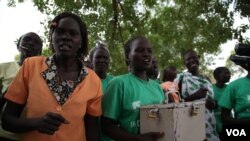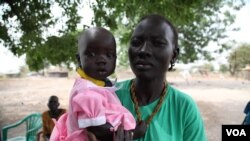RUMBEK, LAKES STATE —
South Sudan is one of the worst places on the planet to be a woman. With the highest maternal mortality rate in the world -- often due to forced or early marriage -- and the total lack of basic services in a country devastated by war, women have never had identity papers and control over their fate. Slowly, aid agencies like the International Rescue Committee are trying to get women on the first rung of the ladder of independence through a unique banking system born out of a simple box.
Under the shade of a tree, women gather, singing and dancing. They are waiting for the bank to open. The bank? A small wooden box.
Teresa Ajok Aduong - the only literate woman in the group -- is the “manager” of this wooden box bank. The women can use their household money to buy $1 shares in the bank and the money is used to loan to members, who pay it back with interest.
Independent only since 2011 and following decades of war, South Sudan’s development has been severely arrested. Only about 16 percent of women are literate and none of the women here have ever had identity cards.
Aduong says that “under Sudan, women were not allowed to do business, it was just men taking cattle from state to state or down to Uganda. Now,” she says, “there are few women selling things in the market or homegrown produce at the roadside. But few men understand that women have an important role in business.”
Monica Ajak Mading is one of many box-bank members who says it has changed her life and allowed the women to help themselves.
She says that what she likes least "about the way men treat women is that they are not responsible, like when women are pregnant and they don’t take them to the clinic, which is very dangerous and causes problems at birth, or women are not given enough to eat.” She says that “many women are malnourished and can die from being unhealthy.”
The bank’s social fund has helped a number of the members to pay for medical treatment for their children, funerals or presents for a new baby.
Aduong is one of the bank’s success stories. She managed to use a loan to make enough to buy cattle --the preferred and most prestigious form of currency in Lakes State -- one that is usually only controlled by men.
She says the first time she bought a bull she was so happy and excited, and when she brought it home, all her husband’s relatives saw. Now she says she wants have big gardens and to be able to hire people to help her cultivate on a wider scale.
At first, men were reticent about letting their wives join the bank and accused them of just sitting around chatting.
Most have since changed their minds as they have seen their fortunes improve. One husband, Akot Dal Machur, was so impressed he became a bank member himself.
Machur says that what he has learned from the group is that women are skillful, and whatever little money they have they can save. He says “men can have hundreds of thousands of pounds, and nothing in a week’s time.”
In a country where according to United Nations statistics over 1,000 people are killed in cattle raids every year, keeping all your money in cows is also a risk. That's another appeal of the bank, according to Machur.
He says that life in Rumbek is better than in the cattle camps, as people can come together and make money. In the camps you can buy a cow and take it back and people come at night to steal it and even kill someone, he says. This way, he says, no one knows how much money you have, even in your pocket, and the money is safe as even the group doesn’t know where the box is kept.
Deborah Arach works for the U.S-based aid agency, the International Rescue Committee, that runs this program. She has watched women who used to be stuck at home with very few prospects increase their fortunes and prosper.
“Now they have changed," said Arach. "They have become strong and they are proud of themselves. They have something to contribute at home as well. Not like before -- you depend on man. Now they are independent.”
Arach says that the bank has also emboldened women to work together to not only make money but to share ideas and solve problems - including problems with their husbands.
Under the shade of a tree, women gather, singing and dancing. They are waiting for the bank to open. The bank? A small wooden box.
Teresa Ajok Aduong - the only literate woman in the group -- is the “manager” of this wooden box bank. The women can use their household money to buy $1 shares in the bank and the money is used to loan to members, who pay it back with interest.
Independent only since 2011 and following decades of war, South Sudan’s development has been severely arrested. Only about 16 percent of women are literate and none of the women here have ever had identity cards.
Aduong says that “under Sudan, women were not allowed to do business, it was just men taking cattle from state to state or down to Uganda. Now,” she says, “there are few women selling things in the market or homegrown produce at the roadside. But few men understand that women have an important role in business.”
Monica Ajak Mading is one of many box-bank members who says it has changed her life and allowed the women to help themselves.
She says that what she likes least "about the way men treat women is that they are not responsible, like when women are pregnant and they don’t take them to the clinic, which is very dangerous and causes problems at birth, or women are not given enough to eat.” She says that “many women are malnourished and can die from being unhealthy.”
The bank’s social fund has helped a number of the members to pay for medical treatment for their children, funerals or presents for a new baby.
Aduong is one of the bank’s success stories. She managed to use a loan to make enough to buy cattle --the preferred and most prestigious form of currency in Lakes State -- one that is usually only controlled by men.
She says the first time she bought a bull she was so happy and excited, and when she brought it home, all her husband’s relatives saw. Now she says she wants have big gardens and to be able to hire people to help her cultivate on a wider scale.
At first, men were reticent about letting their wives join the bank and accused them of just sitting around chatting.
Most have since changed their minds as they have seen their fortunes improve. One husband, Akot Dal Machur, was so impressed he became a bank member himself.
Machur says that what he has learned from the group is that women are skillful, and whatever little money they have they can save. He says “men can have hundreds of thousands of pounds, and nothing in a week’s time.”
In a country where according to United Nations statistics over 1,000 people are killed in cattle raids every year, keeping all your money in cows is also a risk. That's another appeal of the bank, according to Machur.
He says that life in Rumbek is better than in the cattle camps, as people can come together and make money. In the camps you can buy a cow and take it back and people come at night to steal it and even kill someone, he says. This way, he says, no one knows how much money you have, even in your pocket, and the money is safe as even the group doesn’t know where the box is kept.
Deborah Arach works for the U.S-based aid agency, the International Rescue Committee, that runs this program. She has watched women who used to be stuck at home with very few prospects increase their fortunes and prosper.
“Now they have changed," said Arach. "They have become strong and they are proud of themselves. They have something to contribute at home as well. Not like before -- you depend on man. Now they are independent.”
Arach says that the bank has also emboldened women to work together to not only make money but to share ideas and solve problems - including problems with their husbands.





